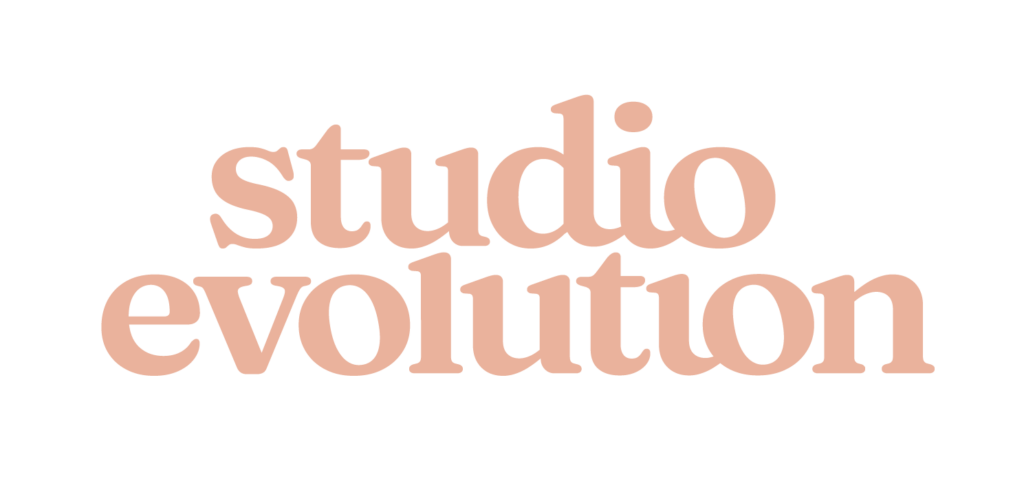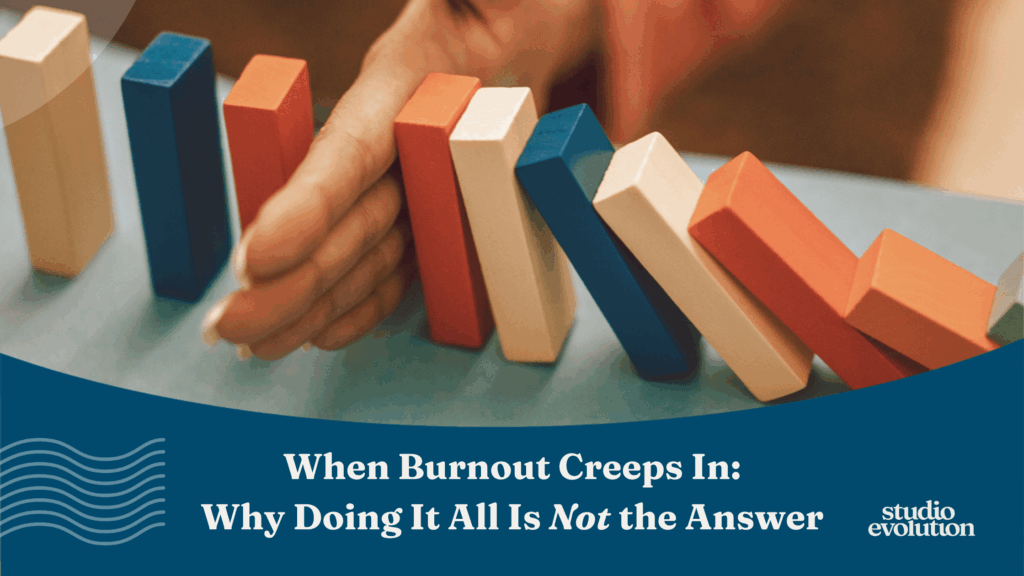Feeling like you’re always putting out fires in your studio? In this episode of Your Studio Podcast, Chantelle and Michelle unpack why delegation feels so hard, and how to finally get your time and headspace back using a simple, proven system.
If you’re overwhelmed, stretched thin, or stuck in “I’ll just do it myself” mode, this one’s a must-listen!
You can also grab your free Studio Admin Cheat Sheet below to help you on your way: https://we.studioevolution.com/studioadmincheatsheet
Please make sure to subscribe and review if you like what you hear!
If you’ve got a studio problem you’d like us to solve, leave us a voicemail here: https://www.speakpipe.com/LeaveEvolutionAVoicemail
Be sure to follow us for more content perfect for Studio Owners!
Instagram: @thestudioevolution
YouTube: @thestudioevolution
Facebook: @TheStudioEvolution
And if you’d like some more support, find out how we could help you here:
Website: studioevolution.com/start
Transcript:
Welcome to Your Studio Podcast, the show for studio owners like you who want more profit, more freedom, and a business that actually supports your life. Hosted by Chantelle Bruinsma and Michelle Hunter, Co-CEOs of Studio Evolution. We’ve helped thousands of studio owners in more than 34 countries grow, scale, and simplify. So whether you’re stuck in survival mode or ready to level up,
you’re not alone you’re in the right place. So pop the kettle on, hit follow
And let’s dive in.
Michelle Hunter (00:40)
like I’m wearing a snow jacket.
Chantelle Bruinsma (00:42)
I know you are. And I’m like, ⁓ baking. I love it. So fun fact that Michelle lives in Melbourne, I live in Sydney. And the weather difference can be staggering.
Michelle Hunter (00:47)
It’s so funny.
Chantelle Bruinsma (00:53)
Well, welcome to your studio podcast, my friends. Chantelle and Michelle here. So happy to be back. And we’re going to talk about something that’s kind of close to your heart, being married to one, Michelle.
Michelle Hunter (01:04)
Yeah. Yeah.
It’s the good old switcheroo of being a firefighter. Day in, day out.
Chantelle Bruinsma (01:12)
Yeah, what’s it like
being married to a firefighter?
Michelle Hunter (01:17)
Look, I have to say the kids excitement, like it just, it wins a hundred points for the kids and for all your friends, mother-in-laws who buy the fiery calendar every year. You know, it doesn’t hurt when you’re at a barbecue and you’re, Mitch is a firefighter. my mom loves firefighters. It’s like, yeah, yeah. It is a bit cringy. No, but seriously, the, the kids love it.
Chantelle Bruinsma (01:29)
Yeah
doesn’t hurt.
bit cringy.
Michelle Hunter (01:45)
look, he does have he he he’s the first point of call for emergency management as in they are there before the paramedics. So the firefighters in his region where he’s in, they their response time is they’re out in 90 seconds. I’ve actually been there visiting the fire station with the kids. And they said come in today, it shouldn’t be as busy. The kids can have a go on the fire truck sit on you know, have a look around. And the call went off the tones went off. And he was out the door within
Chantelle Bruinsma (01:55)
Yeah, huge.
Michelle Hunter (02:15)
90 seconds he was gone within 90 seconds they were suited and out of there so they risk. Yes.
Chantelle Bruinsma (02:20)
I have a question. I have a question
for this. So, cause I know that this could go off while they’re asleep, cause I know they can sleep overnight at the station, right? What happens if this goes off in the middle of the night and you’ve got 90 seconds to get out the door, what if you wake up and you have to pee?
Michelle Hunter (02:27)
Yes.
Mm-hmm.
They go.
Chantelle Bruinsma (02:38)
You’re not allowed to
pee, you just have to get dressed in your suit and you have to get in the car. Because like I’m someone like if I wake up in the night like…
Michelle Hunter (02:41)
Well think they’re really good at-
Well, I don’t think there’s a lot of perimenopausal men and lots of women going on.
Chantelle Bruinsma (02:49)
Stop it, I’ve
always been like this, not just peri.
Michelle Hunter (02:52)
I
Same here, same here, same here! Same here. Yeah.
Chantelle Bruinsma (02:55)
But like that would be horrible,
you wake up, you know when you wake up even with the kids and like then you’re you’ve really got to, like, and was like, if you wake up and the tones go off and you’ve got to get out the door, there’s probably not a pee allowance.
Michelle Hunter (02:58)
Yeah.
No, they’ve got to go. They have to go. And funny story, you say that Mitchell has been woken up in middle of the night and had to go to, I think it was like a big universe, something, it was a fart. It was a false alarm. And while he was there, he was like, Oh my gosh, I really have to go to the toilet. But he was completely suited up. And that’s probably what happens. They just go so quickly. And then it’s an afterthought. think when you have that much adrenaline going through your body, that it just.
Chantelle Bruinsma (03:22)
my God.
Yeah, I bet.
Michelle Hunter (03:30)
is happened, but they are so I think that’s why they don’t have a good quality of sleep. They do get to sleep, but they’re kind of sleeping with one eye open. It’s like when you when you got a newborn baby, right? As soon as the tones go and the whole station’s dark and when it goes off, everything lights up. So you’re like in a dead sleep and then every light is turned on from their main mainframe system. It’s so abrupt. I’ve been there when it’s happened. It is shocking. It is shocking. No, it’s not. Neither is firefighting. So.
Chantelle Bruinsma (03:37)
Yeah.
Very abrupt.
It’s not good for your nervous system.
Michelle Hunter (04:00)
And that’s what we’re talking about. It’s putting in… No.
Chantelle Bruinsma (04:02)
I mean, not that type of firefighting. We’re not going to dedicate an entire episode of this season
of the podcast to talking about being married to a firefighter. There’s a different kind of firefighting, right Michelle?
Michelle Hunter (04:09)
No, but we’re different,
different kind of firefighting. And that’s, know, in your role as a business owner, it’s when you’re in that situation or in that season, when you feel like you’re permanently putting out fires and even, you know, and they’re work fires, it could be, you know, incoming line of communication that always comes to you or a problem that happens with a certain staff member or a system has failed or this has gone down. We need to fix it. That
Chantelle Bruinsma (04:22)
Mm.
Michelle Hunter (04:37)
Also is a form of firefighting that is not good for your nervous system.
Chantelle Bruinsma (04:40)
It’s that feeling that you’re just always reactive and never getting the time to actually work on growing the business because you’re just so consumed by running the business.
Michelle Hunter (04:46)
Yeah.
And it’s a, it’s like a hamster wheel, hard cycle. You know, when you’re in those situations and look, I’m going to be honest, I am guilty of falling back into firefighting mode now and then. Yep. And when I’m in it, I get so frustrated at myself because, you know, we’ve both done so much work to not be in there a lot, you know, with running a big business. We can’t be there. You can’t.
Chantelle Bruinsma (05:08)
I mean, we had a conversation about it last week.
Michelle Hunter (05:23)
sustained growth, you can’t do all the things. So we are really good at not being five-headers, but I’m human and I, you know, as, you know, being a manager of the team and a lot of ops and systems, I frequently am susceptible. And last week I fell into that pattern and I was so frustrated at myself, Chantelle. was so, I called you and I was like, Chantelle.
Chantelle Bruinsma (05:24)
Can’t do all the things anymore. That ship is so odd.
Mm-hmm.
Yeah, you, I observed your frustration. So, okay, so like, let’s talk about it. it’s those, what I kind of notice is like everything converges and there’s a lot of things that aren’t done and there’s a lot of kind of things that haven’t happened. And so you’re left to like, shit, I’ve got to pull this together. Like it comes back onto your shoulders. How did it feel to you? That’s what I noticed.
Michelle Hunter (05:47)
Yeah.
Yep.
So how it happened and how it probably normally happens, it kind of follows a simple thing. When we have something like really big that we’re working on and we’re so committed to, and like, you know, it could be a marketing, like we’re so in line, it’s dialled in, it’s feeling so wonderful. And I, in other areas of the business, I just haven’t delegated probably appropriately to supplement this big event that’s happening in the company or this big marketing campaign that’s happening.
Chantelle Bruinsma (06:19)
Mm.
Michelle Hunter (06:36)
⁓ and it just takes one personal issue or staff being sick or me being wiped out for a week with, you know, with gastro or something like that for it to then converge all those things, the non-delegation and focusing all my energy on, know, one thing which really was moving the needle of the business. ⁓ but then not delegating properly and setting up the system or having an earlier conversation in prep for that. It just all converged.
into one homest.
Chantelle Bruinsma (07:07)
And so what
do you, what’s the internal dialogue when you get to that point of like,
Michelle Hunter (07:14)
Well, I’m… Yeah, I will. was like, ehhh!
Chantelle Bruinsma (07:15)
I mean, keep it clean. Not really.
Swearing is allowed on this pod.
Michelle Hunter (07:21)
To be honest, I get really frustrated and I revert to, if you’re listening and you’ve been in firefighter mode, this is a common self. I’ll just do it. It’ll be quicker. I’ll just do it myself. I’ll take care of it. Like leave it. I’m just going to smash through this. I’m just going to, or I’m susceptible. I don’t even say that. I just do it. I just go straight into implementation mode. ⁓ and a lot of listeners and people who know us, I, in our relationship, Chantelle is like.
Chantelle Bruinsma (07:33)
Leave it with me.
Yeah.
Michelle Hunter (07:49)
full vision, my love language is implementation. So I do love it, but it is probably not a safety net to fall back on because in the, didn’t even say anything. just went into implementation mode and got it done.
Chantelle Bruinsma (07:52)
she loves it.
And I actually felt really bad because we jumped onto a kind of team meeting last week and Michelle jumped on and I could tell she was feeling really stretched. And she was, she’d shown up for this meeting that we kind of planned to have and she was there, but she was like, you could just feel the angst. No, it’s not wrong. wasn’t, I could notice it right. And I was like, what, hun, I got this, I can cover this. You go what you need to do. But what I should have done and I didn’t click it in the minute, hon, was I didn’t have the, I was still hosting this meeting, I didn’t have the, the attunement to like,
Michelle Hunter (08:15)
yeah.
Chantelle Bruinsma (08:30)
what are you working on? What’s happening? What’s kind of feeling stretched? Because what happened is that you went off the meeting and you just did all the things, but these weren’t things that you should have done. They were things that someone else should have done. And so then you took care of it and I was like, we missed an opportunity here.
Michelle Hunter (08:40)
Yeah.
Yeah.
And I look, I actually felt you were so gracious in that moment. You just letting me get off that call was like, oh, thank you. That was like an answered prayer that day because I just went and got it done. But again, it wasn’t until after as well. I reflected and it like, I just went into firefighter mentality. There it is. I’ve worked so hard the last five years. I just got the hose out. Five years of not being a firefighter. Boom. I was there and I was so angry at myself because
Chantelle Bruinsma (09:04)
you just got your hose out.
Michelle Hunter (09:14)
Yeah. And it’s, and it’s, and it’s really, it’s really hard. The internal dialogue. “I’ll just do it.”
Chantelle Bruinsma (09:20)
Well, and I think what I think, you know, the positive we can see here is that you’re not doing it all the time. Like you have your leadership, you know, has come so beautifully, particularly as you know, you’ve been stepping into being a co-owner these last couple of years. So, you know, there is a kind of definite shift in how you feel, but like, you know, for everyone else, I think the resentment that comes from being in firefighter mode long-term. I mean, people are firefighters just for decades. Like it never ends.
Michelle Hunter (09:37)
Mmm.
It never ends and common things I hear from studio owners, you know, break our hearts and we hear it when we know they’re in constant firefighter mode, burnout. I’m overwhelmed. I’m stretched thin. Yeah.
Chantelle Bruinsma (09:55)
overwhelmed.
I’m never at home. Or if I am
at home, I’m not present. Like you’re there, but you’re not really there because you’re head’s somewhere else.
Michelle Hunter (10:06)
Yeah, I’m not home for dinner. I didn’t get to go to basketball or, yeah.
Chantelle Bruinsma (10:10)
I’m exhausted.
I have a lot of fatigue.
Michelle Hunter (10:15)
Time for myself? What time? I can’t go to the gym. It’s… We hear a lot of it.
Chantelle Bruinsma (10:18)
No. And then,
then you get, so maybe let’s say you get 45 minutes sit down at your desk and you’re so burnt out from firefighting, you actually can’t do the big creative strategic work that’s going to really transform the business. And so you get these little windows of time to be able to work clear, but you’re so frazzled. You’re just like, I just want to like watch a cooking show. You wouldn’t watch a cooking show. Let’s be real. That’s not you.
Michelle Hunter (10:42)
That was me. That was me. That was my last week. No, no.
Actually, I just, I’ve been watching a little bit of sport just, yeah, love it. Just car racing. Oh my goodness. Who am I? I know. But it is, I just like switched off my brain, but that’s just from going into firefighting mode one day. And we know being in this situation, we know to really work on the business you can’t.
Chantelle Bruinsma (10:47)
Bye!
What? Really? What kind of sport?
I don’t know, but this is interesting.
Mm.
Michelle Hunter (11:11)
You can’t be there. And it makes me, it makes me just wonder when people are there continually, the cost, the cost it is on themselves and the frustration.
Chantelle Bruinsma (11:12)
No.
I mean, I relate to this in a different way. Like it’s been quite a few years since I’ve been kind of responsible for the inbox and that is a very good thing for this company. But I have struggled with that sense of over-responsibility. I think that’s actually kind of the core thing here. It’s over-responsibility from a creative perspective. And I have not been very successful until very recently on giving full transition of creative output, right? That’s been my journey.
Michelle Hunter (11:25)
Mm-hmm.
Yep.
Yeah.
Mm-hmm.
That’s, that has been your journey. And it’s interesting because, and I think a lot of people can resonate with this, like Studio Evolution is your baby. Like you created, it was your first baby. You created your curriculum, the curriculum, and a lot of our clients, you know, you know, their kids names, like you’re so connected deeply to this business and watching you go through that journey, there was a cost. And we’re like, Chantelle, you can’t do it all. And the question, do you need.
Chantelle Bruinsma (11:58)
It is my first baby.
Oof.
Michelle Hunter (12:20)
I remember Dara sitting across from us going, Chantelle, do you need to do it all? And that’s also very confronting when it’s your baby.
Chantelle Bruinsma (12:28)
It’s really confronting because you can’t do your job properly when you’re trying to do everyone’s job. Like that’s the the simple truth. Do you know I actually found a notebook the other day. Can I just go get it actually? I want to go get it. Yeah.
Michelle Hunter (12:34)
⁓ that’s so true.
Please, please.
Chantelle Bruinsma (12:43)
So I found this old little journal thing the other day and it says, today is 5th of April, 2022. We birthed the new brand to the members. Today, 5th of April, the team asked me to release their wings and let them fly. And I wrote, let them let this new era begin. And I read that back, I was like, holy shit, like that’s huge. And I don’t really know the context of this, but the fact that I had obviously been so trying to hold onto everything so.
Michelle Hunter (12:46)
Hmm.
Chantelle Bruinsma (13:12)
closely that you guys were feeling like remember, even like everyone it’s kind of like I had to kind of sign off on everything and give approval for everything and
Michelle Hunter (13:18)
That’s, that’s
three years ago I think I remember, I remember that time. And that’s like, was a real, I love that you journal and document so much. It’s, it’s, it’s, that was completely like the growth since then. Like that’s, that was a pivotal transformation to you really being comfortable. I don’t have to do all the things.
Chantelle Bruinsma (13:29)
It’s a good thing to look back on actually.
But it would have been you who kind of said to me, release their wings and let them fly. The fact that we would have had a conversation along that, like my control or firefighting or kind of over responsibility was holding you guys all back. I mean, that’s huge. Thank you for that. Thank you. I needed to hear it.
Michelle Hunter (13:49)
Mm-hmm.
Yeah. Well, thank you for being receptive,
because I don’t think that would have been a very easy thing to receive. Yeah.
Chantelle Bruinsma (14:01)
No, wouldn’t have been. But
I think it’s when you get to that point of like, you’re right, this is not working. This is not working. And I think when when you’re in firefighting mode, you can’t quite see the woods for the trees because you are in such a mode of just got to get it done, got to get it done. So you can’t think you can’t slow down enough to get the big picture work done.
Michelle Hunter (14:06)
Yeah.
Yeah.
You’re being woken up at night without being the opportunity to pee and you’ve got 90 seconds to get on the truck. That’s how, that’s how high reactive you are right now in that moment.
Chantelle Bruinsma (14:33)
It’s the truth. It’s the truth. You don’t even have time to pee. You can’t take care of your own basic human needs. It’s really gross.
Michelle Hunter (14:36)
Hmm
That’s so full on that’s
it. Yeah, it is and that’s where a lot of that’s where a lot of studio owners are at, and a lot of business owners are at so how did you get there Chantelle?
Chantelle Bruinsma (14:51)
So that book, it’s one of our really prescriptive books for the leadership pillar that we work on in Evolution. It’s called The Five Levels of Leadership by John Maxwell. And one of the principles that John Maxwell is really famous for is 10-80-10. And it’s kind of you break the workload into these chunks. So it’s the most effective way I’ve learned how to delegate for myself. And it’s what we train our clients to use every day. And it’s something that
we as a team rely on hugely as well. So you start with 10 % of the work for a project you’ve got to get done is on the briefing. So you spend at least 10 % just creating the context, the kind of painting the picture of what it’s going to look like when it’s done successfully, things to consider, ways to go about it, how you’re going to know the milestones of completion. And you spend 10 % really creating this brief.
of what needs to be done. So for us, for example, I recently delegated the creation of some new kind of companions updating of companions. And so I would be writing two to three pages of notes on here are some things to think about, here are some things to include, here are the time dates of when this needs to be done by, here are some resources, here’s
what is expected for you to be able to deliver, here’s where to build the template, he’s an example of one that you can kind of rely on, literally giving them everything they could know. So I write this document and then I record a video talking over this document. So it’s all kind of very clear, like just really giving the context. And then I send that to the team member who has agreed to do it. And this is an expectation of like, it should take you approximately this many hours, here’s the pay rate, like I’m like all the details then and there. The team member then can like, yep.
Michelle Hunter (16:37)
Thank
Chantelle Bruinsma (16:41)
question about this, question about that, just wanted to clarify this, da da da da da. And then they go and do 80 % of the work. So I’ve done the first 10 % of briefing the project. They then go do 80 % of actually doing it. And at that point, like if they need to ping me, they do. Usually if I’ve done a good job of the first 10 % of briefing, they’re good to go. Like often it doesn’t happen. And then there’s like on that first briefing doc, there’s kind of like a milestone dates of when to come back to me with like first revision.
Michelle Hunter (16:50)
Mm-hmm.
Chantelle Bruinsma (17:09)
second revision. So at the first revision point, I can kind of tap back in and just see and like, we on the right page? Are we heading in the right direction? Do I need to do a significant course correction? Oh, no, gone a bit too far that way. Let’s swing back over here. And then they go and do a second kind of a lot of revisions or they proceed to the second bit of the project in that 80%. And then there’s a clear date for the sign off. So then at the sign off point is when I take back over. So I think where a lot of delegation.
falls down is that you’ve probably said, hey could you please run this workshop, set up this recital, work on this marketing thing. And there hasn’t been explicit delegation of kind of expectations and setting it clear. And so then you get this back and it’s like, that’s literally nothing like what I was hoping for. And it’s like, shit, I’ve now wasted all this time. I’m just gonna have to take care of this myself. And we go into firefighting mode, leave it with me. And I won’t do that again.
Michelle Hunter (17:52)
Hmm.
Chantelle Bruinsma (18:07)
that I got burnt, right? And so this last 10%, I know I’m going to spend the last 10 % bringing it to my level. So I’m not expecting it to be necessarily perfect, but 80 % of the work has been done by someone else. And then I kind of come and make the final tweaks. I kind of put the finishing touches on it. I’ll kind of change this and this and da da da da da da da da. But really it’s just editing the final little edits. And that’s how you do 10-80- 10, 10 % on briefing, 80 % someone else does it 10 % you bring it up.
Michelle Hunter (18:18)
Yeah.
Chantelle Bruinsma (18:37)
to where you want it to be. And the reason people don’t delegate or they’ve been burnt from delegation is that they haven’t followed that process. I bet, what do you reckon, Michelle?
Michelle Hunter (18:46)
Yeah. And I think they think it’s too hard to, it’s like muscle memory. Again, we’ve talked about muscle memory a lot the last couple of weeks. And I think they think it’s too hard. It’s so much work in delegating. I might as well do it myself. No, when you do it the first time, clarity is kind. All the detail is so kind. And then the next time you do it, you’re going to get better at it and better at it and better at it and better. it doesn’t take so much time to do that initial investment.
Chantelle Bruinsma (18:56)
Mm-hmm.
Mm-hmm.
I mean,
the best example for you I can think of is your maternity leave. Like when Michelle, Michelle, how many pages was your maternity leave handover doc? It was approximately 90, like 85 to 90 pages of handover. Gosh, I’m so proud of you. It had a contents page and then links to spreadsheets with different like, but Michelle prepared us so well. You know, you took six, seven months off totally and
Michelle Hunter (19:16)
Yeah.
I don’t, I don’t, don’t recall, probably it was under a hundred. It was under a hundred. It was under with indexes.
Yeah, with different departments, links to spreadsheets.
Yep. Off. Yep.
Chantelle Bruinsma (19:41)
we just ran the show like Michelle wanted us to do. I mean, like we probably didn’t do it to her standards. Here’s the other thing. Like I can’t, there’s no way I’m capable of operating like Michelle Hunter. I don’t have it in me. My brain isn’t built this way. I’m not, that’s not my strengths. That’s why I made her a business partner with me. Right? Not my strengths, but I know it. But I don’t expect that of myself. And she probably knows like Chantelle’s not good.
Michelle Hunter (19:51)
you
Yeah, no.
Chantelle Bruinsma (20:10)
The goal was like, don’t burn down the ship, right, Michelle? That was the goal. Chantelle, just don’t fucking burn down the company while I take my hands off for six months.
Michelle Hunter (20:13)
Yeah, that was, and
everyone was so happy. It ran beautifully. It was so good.
Chantelle Bruinsma (20:20)
was fabulous.
We did really, really well. But I think, but you set us up for success. You set me up with clarity and timelines and expectations and you painted the picture of here’s the resources, here’s where to go, here’s what to do, here’s what to think. Like you literally gave me everything I needed so that you could go have this leave for yourself.
Michelle Hunter (20:37)
And I think, yeah, if we can paint that very clearly, the delegation gets a lot easier because it’s clear measurables. And that’s what it is. If we can get very clear on what we need delegated and then doing that finessing at the end. if it’s regular people that are working with you, they’re just going to get better at it. They’re going to know how you think. They’re going to know your expectations a lot better.
Chantelle Bruinsma (20:56)
Yeah.
And here’s the thing, I reckon it’s like what I wrote in that little journal, right? I reckon the team often want to be involved more. They want, they’re seeing you’re stretched. You’re not in an island, right? They’re seeing you’re stretched. They wanna help.
Michelle Hunter (21:09)
Mmm.
Yeah, yeah, that’s right. Yes. And they want to help.
They want to help. They want to help. It’s just got to like not fall into fire fighter mentality and just, you know, get it out, get it clearly laid out and let them. Yeah.
Chantelle Bruinsma (21:26)
And they don’t want to disappoint you either, right? Like here’s the
worst thing about delegation is, you ask someone to do something and then you’re like, well that was a fucking waste of time. And then they feel that they’ve done a bad job. And so then everyone feels icky afterwards. Horrible.
Michelle Hunter (21:34)
Yeah.
Yes!
That is the flip side too, isn’t it? Like when you just do it yourself, how are you making the team feel? Like, do they feel adequate when you just jump in and just like, I’ll just be quicker if I do it. That’s not a nice, that’s not a nice feeling as a team member.
Chantelle Bruinsma (21:53)
But it’s again, it’s like really getting these, the briefing done. And you might be, like I have been delighted. So over the summer, I gave three team members like significant juicy projects to do, like the creation of like 50 page resources, like big stuff work. I have been thrilled. What took me so long to work this all out?
Michelle Hunter (21:58)
right.
Yeah, big stuff. Yeah.
And we giggle about it because the team have been, they love it. They love the work and they love being part of it. Yeah, they do. They do. It’s so true.
Chantelle Bruinsma (22:16)
None.
They loved it. And it’s really good quality. It’s a, it’s a win for
everyone. And that’s allowed me to focus on different times. And so it’s that kind of feeling of, you know, I think there’s a hesitation to delegate because as well, what if they do it wrong? And then when people do it wrong, I’m still going to have to show up with my fire truck and my fire hose and put the fire out. Right? And you don’t, you haven’t got any space or you, you literally haven’t got any head space or time to kind of put out any more fucking fires. I’m swearing a lot today. Yeah.
Michelle Hunter (22:37)
Mm.
Anyway, yep.
Yep. That’s okay.
I think firefighters do too.
Chantelle Bruinsma (22:53)
Okay, good. You’re right.
So, you know, you haven’t got time. So the risk of delegating going wrong stops you from doing it. But here’s how I think about it. So my job and what I get paid for as the leader and like, you know, Michelle, that we have the same thing here is that our job is to empower the team to kind of help this business to run. And my job is that if there are fires,
Michelle Hunter (23:00)
Mm. Yeah.
Yeah.
Chantelle Bruinsma (23:21)
It is my job to put them out. However, if I’ve got the team doing 80 % of the things that I could have been doing, they’re doing 80 % of the things. So if I have to come in and kind of show up for just a bit of it and to put, you know, kind of little course correction or put out a little spot fire, that’s okay because what that has allowed, the spaciousness that’s allowed me in this area of the business in my leadership has been revolutionary, right? There’s nothing that a team member could do that Michelle or I couldn’t fix. Nothing.
Michelle Hunter (23:28)
Yeah.
Yeah, yeah.
Yeah, 100%, 100%,
100%. And the more time we can spend in the spaciousness of the other areas of business, that’s where we know Chantelle, we know that’s where the business grows.
Chantelle Bruinsma (24:00)
Hmm.
And if you have a good team, right? If you’ve got a good team who are capable, they just need the experience and they’re going to stuff it up friends. They’re going to make mistakes. That’s what the final 10 % is for. The final 10 % is there to assume that it’s not going to be how you want it. So let’s accept it. It’s not going to come back signed sealed with a bow ready for kind of publishing. You’re going to need to still put 10 % in. So plan for it. Welcome it. Thank you so much for doing 80%. Gosh, I’m grateful.
Michelle Hunter (24:11)
Yeah, everyone makes mistakes. Yeah.
Chantelle Bruinsma (24:30)
Let me just kind of change a few things here. Good to go. But what you’ve saved by not doing the bulk is freedom. Let the team fly.
Michelle Hunter (24:36)
Yeah,
let the team fly. Let’s do more 10-80-10.
Chantelle Bruinsma (24:42)
More 10-80- 10 less firefighting. So that’s your project for the week. Is there one thing let’s think about this a little, what we call this as a leverage experiment. How can we leverage your time and leverage your team to take more things off your plate? So, and if you haven’t got a team right now, maybe there’s someone you could delegate. Maybe there’s a teenager who could do something for you around for affordable rate. What is one thing in your studio right now that you could delegate that you could hold off your
Michelle Hunter (24:46)
Let’s fly high.
Mmm.
Chantelle Bruinsma (25:12)
hold off your plate and that you could do this 10-80- 10 process with 10 % briefing, allow someone to run for the 80 % and then you come on with the finishing touches for the final 10%. What would that project be right now? Michelle, is there one thing you’re thinking of in your role?
Michelle Hunter (25:29)
There’s, yes, there’s like five things I’m thinking of right now that are coming down. Yeah.
Chantelle Bruinsma (25:33)
Okay, I’m gonna think of some too. We’ll swing back after.
But this is I hope this has been a little practical thing for you. And again, like there’s no there’s no winning in firefighting.
Michelle Hunter (25:43)
Only when your husband does it and gets to play pickleball for two hours in the summer at night.
Chantelle Bruinsma (25:50)
Yeah, while you were at home putting three children to bed. That’s great. The shift work side of firefighting is rough. I observe that for you. A girlfriend of mine was dating a firefighter, like in early stage, like she’d be on two dates with the guy. was like, just so you know, just so you know, shift work with co-parenting is very hard.
Michelle Hunter (25:54)
It’s so good. It’s so good. That’s Yeah, yeah. But we all need them.
Yeah, they’re either there or poof, you can’t see them. Gone. So when they’re in, they’re in, but when they’re out, you are as a, I don’t know who the famous rapper is. You’re ridin’ solo. That song just lives rent free in my head every time I’m bathing three kids. Solo, solo, solo, solo. Yeah, yeah, yeah, yeah.
Chantelle Bruinsma (26:13)
Gone. Nope.
Solo, I’m riding solo, I’m riding solo.
We are totally giving away our era. That’s like a very niche portion of listeners are our age
and know that song I bet. Circa 2003. Yeah, that’s about it. I love it. All right. We’ll see you next time guys. Thanks for joining us for the Your Studio Podcast. We’ll see you for our next episode. Bye.
Michelle Hunter (26:42)
R &B Fridays. Yep, we are revealing our age.
Loved this episode? Hit follow so you never miss what’s next. ready for more clarity, tools and support to grow your studio, head to studioevolution.com forward slash start Your dream studio is possible and you don’t have to build it alone.














